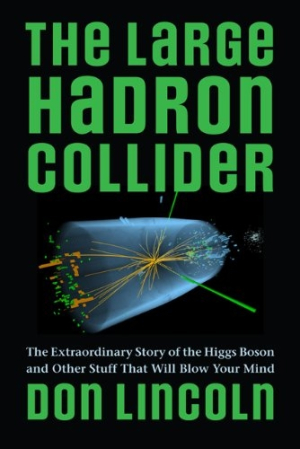The Large Hadron Collider
The Extraordinary Story of the Higgs Boson and Other Stuff That Will Blow Your Mind
This true tale of the largest particle accelerator in history is better reading than fiction.
In a rare exposé of one of the largest scientific research setups in history, Don Lincoln’s latest publication, The Large Hadron Collider, brings to bear an insider’s-eye view of the famous European particle accelerator that ultimately discovered the long-sought Higgs Boson. Far from being a dry didactic account, the book is a fast read brimming with personality.
Reading about the Large Hadron Collider, with its spinning particle streams, hypercontrolled collisions, and awesome implications, is like learning about what wizards do. If tampering with the fabric of the universe was the goal of the ancient alchemists, then the physicists at the LHC are as close to performing magic as anyone in history. Lincoln’s account is factual, direct, and unembellished, but his voice never loses the tinge of delight a researcher feels at being handed this incredible toy. It is impossible to leave The Large Hadron Collider without being moved by the magnitude of the secrets being unlocked at CERN, not to mention the author’s obvious passion for the subject.
While it jumps around a little bit between descriptions of subatomic particles and of the activities and construction of the LHC, longtime physics buffs and scientists won’t find these occasional lapses a barrier to enjoyment of this book. In fact, even students with a minimal background in physics may find this piece enlightening. Its easy, casual tone helps to make the normally daunting topic accessible, and playful anecdotes about the collider and the science that surrounds it will engage even those without initial interest. In fact, this book could hardly have been better published as a recruiting tool for universities specializing in physics. Lincoln makes the discovery of minuscule particles sound like so much fun that any high schooler with a passing interest in general science may be in danger of full conversion to professional theoretical physics.
Physics research can seem intimidating, even for science geeks. The prevailing attitude in the media is that the mysteries of muons and neutrinos are for the eyes of only the most select intelligentsia, the MENSA members in good standing, whose comprehension of the secrets of the universe is beyond explaining to the rest of humanity. The Large Hadron Collider explodes that myth not only by explaining it, but by doing a great job.
Reviewed by
Anna Call
Disclosure: This article is not an endorsement, but a review. The publisher of this book provided free copies of the book to have their book reviewed by a professional reviewer. No fee was paid by the publisher for this review. Foreword Reviews only recommends books that we love. Foreword Magazine, Inc. is disclosing this in accordance with the Federal Trade Commission’s 16 CFR, Part 255.

